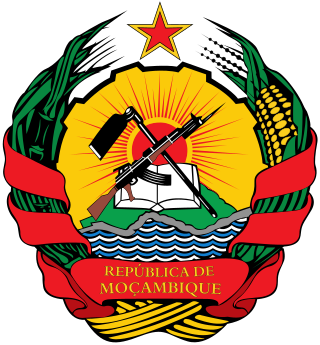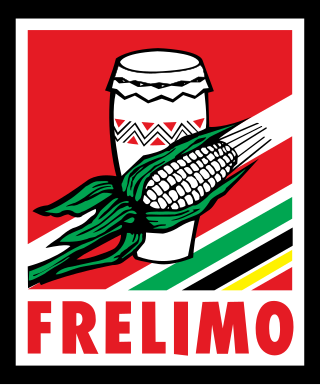Mozambique was a Portuguese colony, overseas province and later a member state of Portugal. It gained independence from Portugal in 1975.

Politics in Mozambique takes place in a framework of a semi-presidential representative democratic republic, whereby the President of Mozambique is head of state and head of government in a multi-party system. Executive power is exercised by the government. Legislative power is vested in both the government and the Assembly of the Republic.

Joaquim Alberto Chissano is a Mozambican politician who served as the second President of Mozambique, from 1986 to 2005. He is credited with transforming the war-torn country of Mozambique into a successful African democracy. After his presidency, Chissano became an elder statesman, envoy and diplomat for both his home country and the United Nations. Chissano also served as Chairperson of the African Union from 2003 to 2004.

FRELIMO is a democratic socialist political party in Mozambique. It has governed the country since its independence from Portugal in 1975.

Luísa Dias Diogo is a Mozambican politician who served as Prime Minister of Mozambique from February 2004 to January 2010. She replaced Pascoal Mocumbi, who had been prime minister for the previous nine years. Before becoming prime minister, she was Minister of Planning and Finance, and she continued to hold that post until February 2005.

The United Nations Operations in Mozambique was a UN peace mission to Mozambique established in December 1992 under Security Council Resolution 797 with the assignment to monitor the implementation of the Rome General Peace Accords agreed upon by the Mozambican president Joaquim Chissano of FRELIMO, the Front for Liberation of Mozambique, and Afonso Dhlakama of RENAMO, the Mozambican National Resistance. The operation was one of the most significant and extensive UN operations and it sought to demobilize and disarm troops, provide humanitarian aid, and oversee the elections. The operation ended in December 1994.

Armando Emílio Guebuza is a Mozambican politician who was the third President of Mozambique from 2005 to 2015.

General elections were held in Mozambique on 1 and 2 December 2004 to elect a president and the Assembly of the Republic. Incumbent president Joaquim Chissano stepped down after 18 years in power, with five candidates running to succeed him. Armando Guebuza of the ruling FRELIMO party won, with over 60% of the vote. FRELIMO also won the Assembly elections, taking 160 of the 250 seats. Turnout for both elections was just over 36%.

Mozambique elects representatives at several levels:
The Rome General Peace Accords, officially the General Peace Accords, was a peace treaty signed between the government of Mozambique and RENAMO, ending the Mozambican Civil War on October 4, 1992. Negotiations preceding the agreement began in July 1990. They were brokered by a team of four mediators, two members of the Community of Sant'Egidio, Andrea Riccardi and Matteo Zuppi, as well as Bishop Jaime Gonçalves and Italian government representative Mario Raffaelli. The delegation of the Mozambican government was headed by Armando Guebuza, who went on to become President of Mozambique. The RENAMO delegation consisted of Raul Domingos, José de Castro, Vicente Ululu, Agostinho Murrial, João Almirante, José Augusto and Anselmo Victor. The accords were then signed by the then-president of Mozambique Joaquim Chissano, and by the leader of RENAMO, Afonso Dhlakama.

Carlos Alberto Lopes Cardoso was a Portugese-Mozambican investigative journalist. His assassination in 2000 followed his newspaper's investigation into corruption in the privatisation of Mozambique's biggest bank.
Mariano de Araújo Matsinhe is a Mozambican politician. He was a member of the Politburo of FRELIMO during the 1980s. Matsinhe also served as the Mozambican Security Minister in the 1980s.
Leonardo Simão is a Mozambican politician. Simão joined the FRELIMO government in 1982 as the Director of Health in Zambezia. In 1986, he became the Minister of Health, remaining in that role until the 1994 election when he was elected to parliament. In December 1994, Simão became the Minister of Foreign Affairs and Cooperation of Mozambique under Joaquim Chissano, until February 2005 when Armando Guebuza, also of FRELIMO, became President, replacing Simão with Oldemiro Baloi.
Alberto Joaquim Chipande is a Mozambican politician and a long-time leading member of FRELIMO. He was the first Defense Minister of Mozambique upon independence in 1975, remaining in that post until at least 1986 under President Samora Machel. Chipande was also a member of the Political Bureau of FRELIMO, which ran the government for 18 days in late 1986 after the death of Machel. He is also a FRELIMO member of the Assembly of the Republic from the Cabo Delgado Province.

Uria Timoteo Simango was a Mozambican Presbyterian minister and prominent leader of the Mozambique Liberation Front (FRELIMO) during the liberation struggle against Portuguese colonial rule. His precise date of death is unknown as he was extrajudicially executed along with several other FRELIMO dissidents and his wife, Celina by the post-independence government of Samora Machel.

United Nations Security Council resolution 782, adopted unanimously on 13 October 1992, after welcoming the Rome General Peace Accords signed on 4 October 1992, in Rome between the FRELIMO (government) and RENAMO (rebel) parties in the Mozambican Civil War, the council approved the appointment of an interim Special Representative and the deployment of up to 25 military observers to Mozambique. The Special Representative was an Italian, Aldo Ajello.

United Nations Security Council resolution 960, adopted unanimously on 21 November 1994, after reaffirming Resolution 782 (1992) and all subsequent resolutions on Mozambique, the Council welcomed and endorsed the recent elections on 27–29 October 1994 in accordance with the Rome General Peace Accords, noting a declaration that they were free and fair by the Special Representative of the Secretary-General.

General elections were held in Mozambique between 3 and 5 December 1999 to elect a president and the Assembly of the Republic. Incumbent president Joaquim Chissano won a narrow victory against Afonso Dhlakama, whilst Chissano's FRELIMO party won the Assembly elections, taking 133 of the 250 seats. Voter turnout for the elections was around 68–70%.
Alberto Massavanhane was a Mozambican diplomat, teacher, and the first Mayor of Maputo. After the signing of Lusaka Accord, in 1974, Massavanhane was nominated by Frelimo as Mayor of Lourenço Marques during the transition government, becoming the first Mozambican to be President of the Executive Council of Maputo after Independence of Mozambique in 1975. In 1983 Alberto Massavanhane was again called to be the head of Maputo local government, before being designated as Ambassador of Mozambique in the Kingdom of Sweden, also covering Denmark, Finland, Iceland and Norway, from 1988 until his death in 1993.











